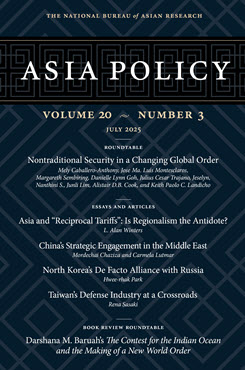Essay in Asia Policy 20.3
Asia and “Reciprocal Tariffs”
Is Regionalism the Antidote?
This essay argues that Asia’s system of regional trading agreements will not protect countries from the uncertain and chaotic U.S. tariff policy but that this system nonetheless might help underpin a global response.
Note: This is the first in a series of four essays in 2025–26 on trade policy made possible by the generous support of the Hinrich Foundation. The author is grateful to the editors for excellent comments on an earlier draft.
EXECUTIVE SUMMARY
MAIN ARGUMENT
Asian countries are signatories to many trade agreements that have featured innovation, steady persistent cooperation, and large coalitions, all of which are factors that may be important in preserving the world trading system from the Trump administration’s tariffs. However, these agreements are not a unified system and are mostly shallow; thus, without extension they will not produce new trade flows to counter losses in U.S. markets. Although President Donald Trump’s trade policy is chaotic and destructive, his new trade restrictions are unlikely to disappear completely, even with international pressure and hostile equity and bond markets. No Asian country will be able to avoid economic stresses resulting from the reduction in world growth that these policies could cause. The most vulnerable will be the developing countries that have actively pursued export-led development with the U.S. as a primary partner. With uncertainty prevalent, a global response to Trump’s tariffs based on World Trade Organization (WTO) rules is desirable.
POLICY IMPLICATIONS
- Although it may be a difficult and time-consuming process, Asian countries should extend and deepen their regional trading arrangements.
- In negotiating new tariffs with the Trump administration, governments should try to make their responses nondiscriminatory.
- At a minimum, countries should not agree explicitly to penalize other countries—for example, by joining Trump’s trade war with China. Governments should deal with China according to their own national interests.
- Countries should open negotiations with non-U.S. members of the WTO to liberalize mutual trade and update the WTO’s rules. The U.S. should be allowed to join these talks but not to veto them.
L. Alan Winters is Professor Emeritus and former co-director of the Centre for Inclusive Trade Policy at the University of Sussex (United Kingdom).
About Asia Policy
Asia Policy is a peer-reviewed scholarly journal presenting policy-relevant academic research on the Asia-Pacific that draws clear and concise conclusions useful to today’s policymakers. Asia Policy is published quarterly in January, April, July, and October and accepts submissions on a rolling basis. Learn more


